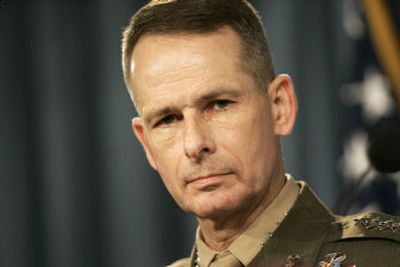Pentagon reviewing Iraq goals

WASHINGTON – The Pentagon is conducting a major review of the military’s Iraq strategy to determine “what’s going wrong and should be changed” to attain U.S. objectives in the war-torn country, the nation’s top general said Friday.
The chairman of the Joint Chiefs of Staff, Marine Gen. Peter Pace, initiated the review this fall after starkly deteriorating security in Baghdad led commanders there to rule out any significant cut in the level of U.S. troops in Iraq – now at about 145,000 – according to senior defense officials and sources.
Pace said he is working with Army Gen. George Casey, the top U.S. commander in Iraq, and Army Gen. John Abizaid, who as head of Central Command oversees the U.S. military in the Middle East, on recommendations for how to improve Iraq strategy.
The military’s growing view is that Iraq is at a crossroads, spurred largely by intensified sectarian fighting and mounting U.S. casualties on the ground. Pace’s review coincides with political pressure in Washington to find alternatives to the current Iraq policy, heightened by this week’s election and the Democratic takeover of Congress.
Pace is scheduled to meet early next week with members of the Iraq Study Group, a bipartisan commission mandated by Congress to review the Bush administration’s Iraq policy and propose changes, a senior defense official said. Pace’s review and other military recommendations are expected to be merged with the work of the Iraq Study Group as part of a broad effort by the administration to redefine Iraq policy. “It will become part of something bigger,” the source said.
“We need to give ourselves a good, honest scrub about what is working, what is not working, what are the impediments to progress, and what should we change about the way we’re doing it,” Pace said in an interview Friday with CBS News.
In a string of television appearances to mark Veterans Day, Pace declined to provide details of any specific recommendations for major military shifts in Iraq, saying that would be “premature” and could compromise the effort. “We should not be signaling to our enemies what we’re going to do next,” he told MSNBC.
Sources said that Pace’s review marks a more fundamental and open-ended look for possible solutions in Iraq than the military has undertaken to date, growing out of a realization that Iraq could descend into chaos and that the current strategy is inadequate.
“The collapse of the strategy in Baghdad … caused a very deep introspection by the military,” said a source connected to the Pentagon.
Asked by one interviewer whether the United States is winning the war in Iraq, Pace replied: “You have to define ‘winning.’ I don’t mean to be glib about that.
“Winning, to me, is simply having each of the nations that we’re trying to help have a secure environment inside of which their government and people can function,” he said, in remarks that seemed to depart significantly from the administration’s more ambitious stated goal of building a thriving democracy in Iraq.